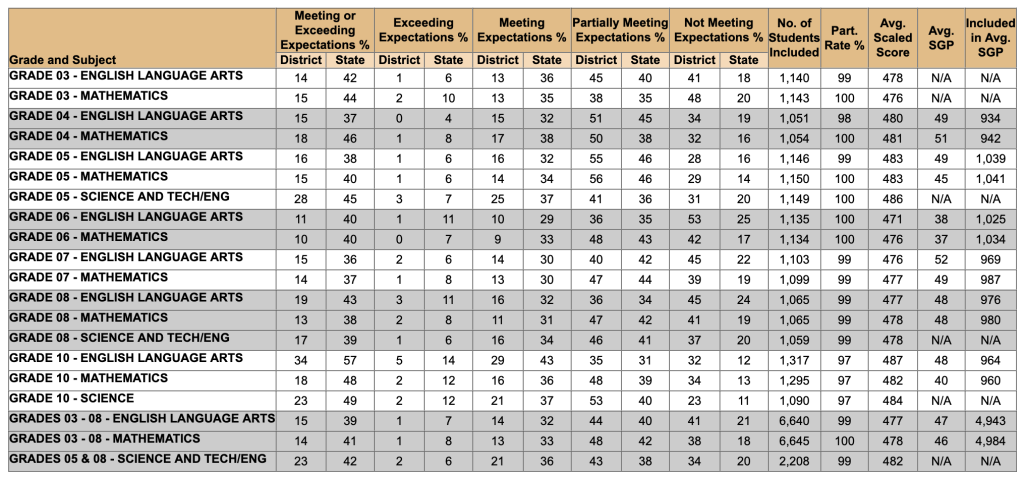
The Department of Elementary and Secondary Education (DESE) announced the 2024 attendance rates and Massachusetts Comprehensive Assessment System (MCAS) results today at the Board of Elementary and Secondary Education meeting, showing improvement in some areas, including science and technology/engineering, and challenges in others, particularly in terms of overcoming the disruption that some of the state’s youngest learners experienced during the pandemic that impacted some of their most critical foundational skills.
Compared to 2023, the statewide MCAS results released today include mostly improving results in science and technology/engineering, relatively stable results in math, and declines in English language arts. The English language arts scores for students in grades 3-5 declined by 2 to 6 percentage points compared to last year. Those students were in preschool through first grade in March 2020 and missed key consistent in-person instruction on foundational skills during the height of the COVID-19 pandemic.
“Change in education is a process, not an event. As the MCAS results show today, the road back from the pandemic is not short. We’re encouraged to see that students are making gains in science and technology/engineering, but there is still more work to do in English language arts and math,” said Education Secretary Patrick A. Tutwiler. “To address these challenges, the Healey-Driscoll Administration has invested record funding in K-12 education, launched a public awareness campaign about the importance of school attendance that is showing results, created a nation-leading early literacy strategy and made universal school meals permanent. These scores demonstrate the importance of continued assessment and accountability, and we’re going to continue to build, on these efforts to help all of our students realize their dreams and ambitions.”
These results come one year after the National Assessment of Educational Progress found that the nation’s 13-year-olds had declined in both mathematics and reading. This year, districts and states as varied as New York City and New Hampshire have announced mixed results.
Investments in Literacy
The Healey-Driscoll Administration kicked-off their bold early literacy initiative last week – Literacy Launch, an initiative focused on improving literacy instruction for students age 3 to grade 3. Under Governor Maura Healey’s leadership and partnership with the state Legislature, Massachusetts’ Fiscal Year 2025 budget made historic investments in early literacy that included $20 million for the first year of Literacy Launch. Today’s released results underscore the importance of this investment, helping schools and community-based preschool programs acquire and implement evidence-based reading materials and accelerating DESE’s reviews of educator preparation programs’ early literacy training. The state also recently received over $38 million in federal funding for early literacy grants.
Addressing Absenteeism
The state’s schools and families continued to show progress in addressing chronic absenteeism, with the statewide rate decreasing from 22.2 percent to 19.7 percent of students chronically absent last school year. Five districts have chronic absenteeism levels that are more than 5 percentage points below their pre-pandemic rates and lower than the statewide average: Clinton (7.7 percent), Franklin County Regional Vocational Technical School in Turners Falls (14.3 percent), Hawlemont (serving the towns of Charlemont and Hawley) (3.9 percent), Libertas Academy Charter School in Springfield (12.6 percent), and Wellfleet (8.8 percent). While students statewide are still missing more days of school than they did before the pandemic, Massachusetts is seeing improvement in this area and trending notably in the right direction.
The Administration has also been focused on reducing chronic absenteeism rates, recently launching the “Your Presence is Powerful” awareness campaign. Missing school can cause students to fall behind on their academics, and attendance is also important for social interaction with friends and trusted adults and access to supports such as free school meals and mental and physical health resources.
“We know that consistent attendance is the key to learning, and we’ll continue to work with schools and districts to help them connect with students and families, make schools welcoming places and offer students interactive, real-world and engaging lessons,” said Russell D. Johnston, acting commissioner of elementary and secondary education. “I have also been meeting with a working group representing teachers, school committees, superintendents, charter school leaders and equity leaders in order to help us identify additional ways to accelerate student achievement in the pandemic’s wake.”
Historic state funding
The state’s FY25 budget investments also fully fund the state’s Student Opportunity Act, which is phasing in additional state funds for districts, particularly districts in Gateway cities with high concentrations of low-income families. The state has also made historic state investments in universal free school meals and student mental health supports under the Healey-Driscoll administration.
Also today, DESE released 2024 accountability results. This year’s information includes data on accountability indicators(download) such as graduation and chronic absenteeism rates, and it also includes school percentiles, determinations of each district’s and school’s need for assistance or intervention, and their progress toward goals in each indicator.
The vast majority of schools – 82 percent – that received an accountability designation were identified as “not requiring assistance or intervention.” Fifty four percent of schools met, exceeded or made “Substantial Progress Towards” their accountability targets.
This year, DESE is again identifying a number of Schools of Recognition for their strong improvement or overall achievement. This year’s group includes 57 schools across the state, from Fenway High School in Boston to the Becket Washington Elementary School in Becket. In addition, seven Massachusetts public schools were recognized this week as National Blue Ribbon Schools for overall excellence or narrowing achievement gaps among subgroups of students. Those schools are:
- Martin Luther King Jr. School, Cambridge
- Cohasset High School
- Charles Taylor Elementary School in Foxborough
- Robert H. Adams Middle School in Holliston
- A.E. Angier School in Newton
- Williams Elementary School in Pittsfield, and
- Joseph E. Fiske School in Wellesley.
Detailed MCAS results
Science
Science scores increased in grades 5 and 10 and decreased in grade 8.
| Grade | 2023 %M/E | 2024 %M/E | Change M/E 22-23 |
| 5 | 42% | 45% | +3 percentage pts. |
| 8 | 41% | 39% | -2 percentage pts. |
| High School | 47% | 49% | +2 percentage points |
Math
Compared to 2023, the percentage of students scoring Meeting or Exceeding Expectations in math remained the same in grades 3-8. The percentage of students who scored Meeting or Exceeding Expectations in grade 10 decreased 2 percentage points.
| Grade | 2023 %M/E | 2024 %M/E | Change M/E 23-24 |
| 3-8 | 41% | 41% | (none) |
| 10 | 50% | 48% | -2 percentage pts. |
English language arts
English language arts scores decreased in 2024 as compared to 2023.
| Grade | 2023 %M/E | 2024 %M/E | Change M/E 22-23 |
| 3-8 | 42% | 39% | -3 percentage pts. |
| 10 | 58% | 57% | -1 percentage pt. |
MCAS results for Lynn


About Accountability Results
District and school accountability data will be available at https://profiles.doe.mass.edu/statereport/accountability.aspx.
Acting Commissioner Johnston has not made entry or exit decisions on Underperforming or Chronically Underperforming schools. All schools previously identified by the Commissioner as Underperforming or Chronically Underperforming have maintained that status as part of today’s announcement, and each school’s status will be evaluated by the Commissioner in the coming weeks.
The above press release was submitted to us by the MA Department of Elementary and Secondary Education.
If you have a news story that you would like to share, please contact us via email or call 781-780-9460.

